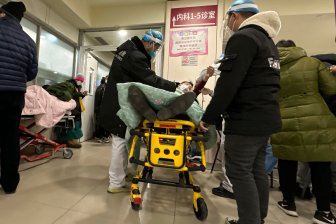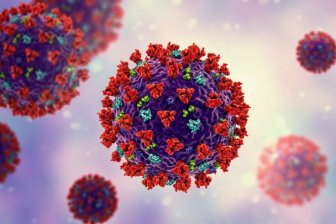Canada’s COVID travel rules for China won’t stop spread of new variants: experts – National | Globalnews.ca
Canada‘s requirement of a negative COVID-19 test of travellers from China will not help in preventing new variants or the spread of the virus, say experts.
Kerry Bowman, assistant professor at the University of Toronto’s Temerty Faculty of Medicine, called the requirement “absolutely a political move, and not based on science at this point.”
Read more:
Canada will require COVID-19 testing for flights from China as virus surges
Read More
-
![]()
Canada will require COVID-19 testing for flights from China as virus surges
“This isn’t the early days of the pandemic,” he said. “So, I do think it’s largely political.”
The federal government said Saturday that people coming from China, Hong Kong and Macao will have to test negative for COVID-19 before leaving for Canada.
The requirement will apply to all air travellers aged two and older from the three countries and will begin on Jan. 5, it said.
China’s reversal from strict COVID-19 control measures has caused widespread infection in that country, although there is not much known about what various Omicron variants are in circulation, said Bowman, who teaches bioethics and global health.
“I don’t think it’s a great idea. I don’t think it makes us safer. On the surface of it, looks like governments are being proactive and sensitive and protecting their citizens,” he said.
“But it’s pretty clear that point of entry screening is not very effective at all. Often people can test positive days and weeks later.”
Dr. Isaac Bogoch, associate professor at University of Toronto’s Temerty Faculty of Medicine, said it’s not entirely clear what the policy’s goals are, but such measures have not helped.

“We know from the past that very focused and targeted travel measures such as this don’t do much to prevent the spread of COVID, either by importing COVID to Canada, or by the threat of variants of concern in Canada,” he said.
Bogoch said it would have helped if China had been transparent with their COVID-19 data, variants, vaccines and spread.
“But let’s not pretend that requiring travellers from China to have a negative PCR test before coming to Canada will have any impact on the Canadian experience with COVID-19,” he said. “It won’t.”
Research has shown how the virus spreads through human mobility, which means that the next variant of the virus may not even emerge from China, and even if it did, it could land in Canada from other indirect routes, he said.
Read more:
WHO urges China to share more COVID info amid viral surge, transparency concerns
Canada hasn’t been able to prevent variants as seen with Alpha, which emerged in the United Kingdom, Delta that was first discovered in India and Omicron, which arose in southern Africa, he said.
“So just requiring a negative PCR test from Chinese travellers, from a science and medical standpoint, will not have much impact for Canada,” Bogoch said.
“And that’s just unfortunately the way it is. What we can do is take measures to help reduce the burden of COVID in Canada, but we’re not going to stop the importation of this infection.”
A more effective measure, Bowman said, would be testing wastewater from airplanes and airports to check for the viral load and mutations.
Vancouver International Airport said Saturday it would expand its wastewater testing pilot program.
One of the variants, XBB. 1.5, causing concern and spreading rapidly is already in North America, Bowman said.

“It’s so important that we stay evidence based,” he said.
“I think in the years ahead when this story is told, when we have some objectivity, which I don’t think any of us really have, including me — when we’re really away from this — I think when we look at the big picture globally, we’re going to see that we did a lot of things that were much more political than evidence based.”
Bogoch said the virus that causes COVID-19 continues to mutate.
Most people in Canada have some form of immunity through a combination of vaccines and previous infections, he added.
Across the world, he said it would help people if there was more sequencing of data that would help identify and understand emerging variants.
“There’s unfortunately, less and less sequencing happening.”
Read more:
China to resume issuing passports, visas for travel abroad despite COVID-19 surge
But people, especially the elderly and those who have other health conditions, should get boosted to keep safe, he said. Masking in indoor settings can also reduce the probability of infection.
“If we look ahead at the foreseeable future, we’ll see waxing and waning of COVID-19 in the community. We’ll have periods of time where it’s higher, we’ll have periods of time where it’s lower just like we’ve seen over the past two years,” Bogoch said.
“And hopefully, future waves of COVID will be less and less impactful as we move forward.”
© 2023 The Canadian Press
For all the latest World News Click Here
For the latest news and updates, follow us on Google News.







